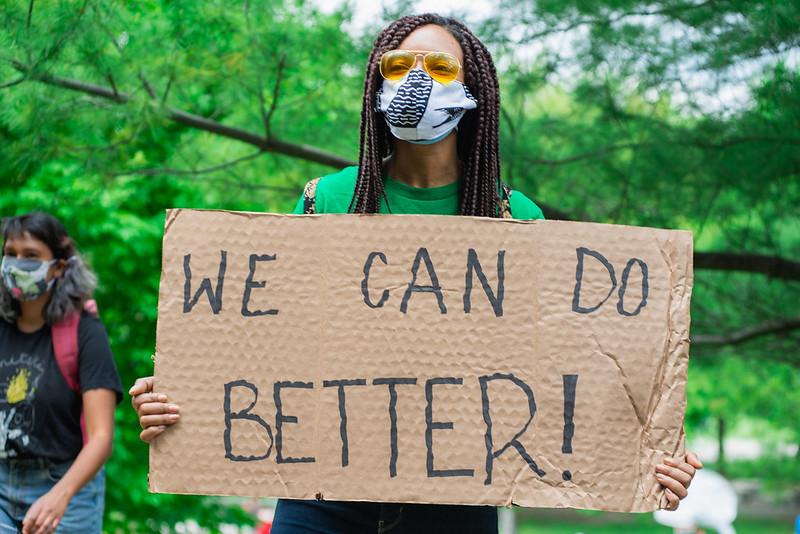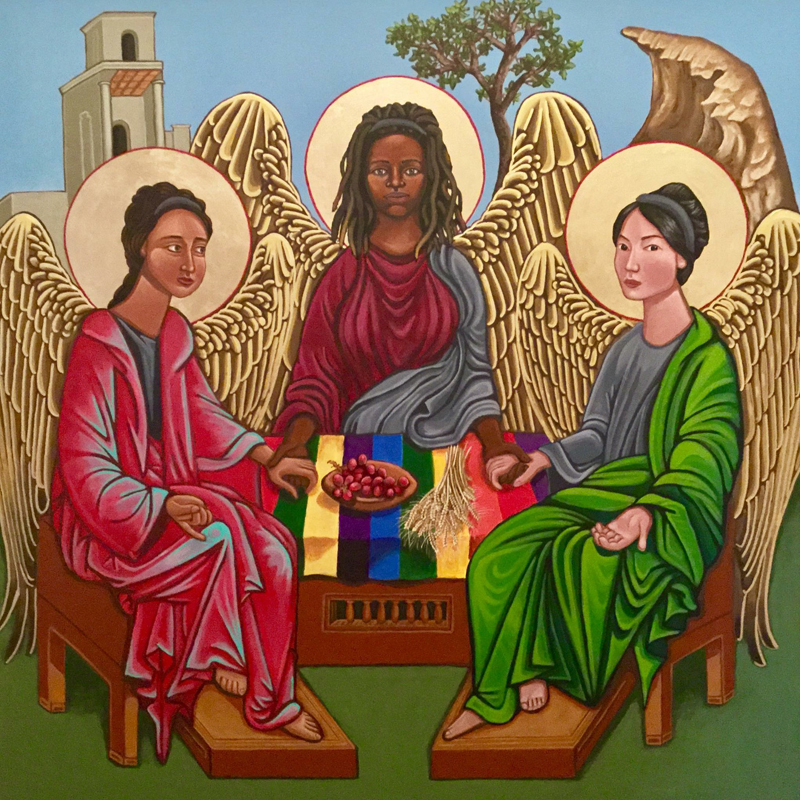Revised Common Lectionary Reflection, Trinity Sunday, Year A
June 7, 2020
Lessons: Genesis 1:1-2:4a; Psalm 8, 2 Corinthians 13:11-13; Matthew 28:16-20
Theme: God’s faithful and generous people are ready to roll up their sleeves and do the hard work of building beloved community.
Key Scripture: “Finally, brothers and sisters, farewell. Put things in order, listen to my appeal, agree with one another, live in peace; and the God of love and peace will be with you.” -2 Corinthians 13:11

Icons of the Holy Trinity have long held a fascination for me, probably because of the relational nature of God. God’s self is relationship expressed in the concept of the Trinity; how cool is that? Our lessons this week offer a lovely opportunity to address our human need for relationship and the distinctly divine way that promises to lead us into the Body of Christ, into being more than we can ever be alone.
Here in the United States, we remain a deeply fractured nation. We didn’t become this way overnight. No, America’s fractures are some 400 years in the making. The minute we decided as a people that some of us have more worth, more value than others, the fracturing began. The fracture continues its insidious work of dividing us and fraying the edges of fragile and often unjust contracts that have held us together as Americans.
Of course, perspective is everything. If the description in the previous paragraph doesn’t sit quite well with you—good! Words and syntax matter, as well as what we emphasize and who or what in the writing takes the blame. Chances are you’ll be preaching and teaching to God’s beloved people across the divide, hopefully building some bridges in the process. So yes, proceed with an awareness of your context, but please do not fail to speak to the gospel issues of our time, to communicate clearly the truth proclaimed in great love. Remember that the Advocate is with you, and that the Spirit will give you words, wisdom, and strength when you move your lips and your feet in truth with love always leading.
Why not use this Trinity Sunday to ponder the relational qualities of God (Father/Creator/Holy Parent, Son/Redeemer/Beloved Sibling, Spirit/Sustainer/All Wisdom — to name a few ways folks talk about the Triune God) that we know in our hearts God desires for our communities? What kind of “Body” does Christ want us to be for him now? What do the lessons this week teach us about life in community as people of God? What needs to change about our communities as we emerge into uncharted post-pandemic seas? How can we be people who help effect that change, people who work for justice, peace, and common good for all people?

Here are a few entry points into the lesson that could be helpful in addressing what it means to be the Beloved Community, an expression of church and society that includes all people in just and equitable decisions affecting life, opportunity, and wellbeing. Blessings on your faithful preaching, teaching, and ministry. What you’re doing right now matters greatly. Above all, thank you for speaking truth to power, the gospel of Jesus, and a call to be the church as the world groans for change and an equal place for all at life’s table.
Genesis 1:1-2:4a: The story of creation finds God taking great delight in the goodness of all creation. Even at humankind’s entrance into the divine narrative we find God does not operate in isolation and is relational in and of God’s very self. We humans are created in the divine image; therefore, when we look into the eyes of another, we see reflected that very image of God. In community we begin to see the wonder and delight of our “createdness,” with its natural divine DNA pull toward relationship. Yes, when we are aware of God present all around us, we are more inclined to seek out, build, and sustain community. We are not created to be alone.
Psalm 8: Ah, that funny word “dominion” in verse six. It’s caused all kinds of havoc in its misuse, including fueling the flames of climate change deniers. If we are created just a little lower than the God, and God cares for us enough to entrust us to care for all of creation, doesn’t it follow that we would tend to all areas of creation with the same care that God extends to us? Makes sense, right? Yet here we are making decisions and policies that contribute to the destruction of God’s sacred creation. How do we as disciples of Christ square those two polarities? What does our faith call us to do about it?
2 Corinthians 13:11-13: Paul concludes his message to the Church at Corinth with instructions to find common ground and live in peace. He reminds them that the “God of love and peace” will be with them. Don’t we long for communities marked by grace, love, and communion? Isn’t that supposed to be what the church addresses in connecting us to Christ? How are we doing in being “Beloved Community” in our contexts—before COVID-19 and now? What might we do differently or better going forward?

Matthew 28:16-20: I’ve always thought this was an odd choice for a Trinity Sunday gospel lesson, but this year it suddenly makes sense. These last instructions of Jesus are a concise summary about what the church is to be up to in the world. We’re made to praise and worship, yet sometimes we will doubt, and still God’s love is all encompassing and good. We walk in the path of Jesus’ full cosmic authority to go and make more disciples. Hey! That sounds like building community—Beloved Community. How can we reimagine our holy community building as we emerge from sheltering in place? For what have you deeply longed to experience within Christ’s body? How can we make our spaces more open, inclusive, and participatory? What needs of our community around the church facilities are we not helping to meet? Do we know our neighbors? What do you hear God calling us to be and do?
In Worship
Many of us are still sheltering in place or perhaps meeting outside in large open spaces or in cars in the parking lot (may not work so well in more southerly climes). How might you “take” people to places where stories of beloved community are unfolding right before our eyes? Consider using some of the powerful images and stories available. Take great care with language and be sensitive to the daily realities, weariness, and pain our siblings of color are experiencing right now—and every day. There are some beautiful stories out there. Check your social media feeds or do a quick Google search and you’ll find stories aplenty. Invite worshipers to share brief stories of their own in the comments section of your digital worship platform. If you’re meeting in person, invite people to submit stories to your community’s Facebook page or images and brief summaries tagged to your congregation’s Instagram feed.
With Youth
Please do try to touch bases with your youth this week. If you are able to host a group digital meeting, all the better. Providing safe space for youth to process their passions, concerns, emotional responses, and questions is critical in times like these, and most youth are quite adept at digital connection. If your youth have attended any protests or vigils, invite them to share their impressions. What matters to them? What do they see the church doing and how should the church be called to respond to issues of racism, police brutality, economic injustice, redlining, hunger, gun violence, poverty, discrimination in housing or employment for people of color and the LGBTQ community? Be prepared, if possible, with knowledge of your denomination’s social statements, justice and anti-racism work, scriptural guidance/references, and history (including what’s not found in standard textbooks). If you’re not sure, don’t be afraid to say so but promise to find answers, and then deliver the next time you gather.
With Children
This week’s focus verse is Genesis 1:26 – Then God said, “Let us make humankind in our image, according to our likeness; and let them have dominion over the fish of the sea, and over the birds of the air, and over the cattle, and over all the wild animals of the earth, and over every creeping thing that creeps upon the earth.”
Wow! There’s a lot of important stuff we need to know in this verse. God created humankind in God’s own divine image. That means all of us carry that image within us—all of us. Not just the people who look like us, act like us, like the same things we like, think the same way. You get the picture. But God loves and is imaged in all people. Then God gives all people dominion over the rest of creation. Some people have taken that to mean that we can treat creation and people however we want because we’re in charge. But it really means that we have the responsibility to love and care for the earth and for one another.
Young people just a few years older than you are making a big difference by teaching us what dominion really looks like and teaching us how to be caretakers for the earth and for one another. We act faithfully in the image of God when we love and care as God loves and cares for us.
Finish with a simple echo prayer and blessing.
Dear God (Dear God),
Thank you (Thank you) for all that you have created (for all that you have created). Help us to care for our planet (Help us to care for our planet), love You (love You), and love all our neighbors (and love all our neighbors). Keep us from fear (Keep us from fear). Keep us hopeful (Keep us hopeful). Make us helpful (Make us helpful). Give us peace (Give us peace). Amen (Amen).
Weekly Stewardship Bulletin Insert
Summertime and the living’s still crazy. We’re not yet normal, whatever that was. Yet ministry still happens. So thank you for sharing, for caring, and for loving all. (Optional awkward sing-a-long opportunity to the first lines of “Summertime”) Seriously, your gifts are one tangible sign of your connection to and support of our community. For that we are indeed most grateful.
Stewardship at Home
How can you keep the threads of your community connected? How about writing to a church member you don’t know well, just to say hello and send up a prayer for them and their wellbeing? Or you might call shut-ins who are more lonely than ever with restrictions nursing homes and retirement communities. Perhaps you will be called to protest in your community, to affirm that #Blacklivesmatter, and to protest centuries of mistreatment by morally corrupt power structures. You might write notes thanking your local first responders, police, and fire companies for their work in difficult times. Write or call elected officials to express your concerns. Learn more about privilege, institutional racism, poverty, the criminal justice system, and corporate responsibility and how these elements have contributed one painful layer at a time to our current situation. The key element is Jesus, who calls us as the Beloved Community, his body the church, to follow his lead and respond accordingly. Each one of us can take some action in response to our faith commitments and understanding. Please don’t sit this one out.
2017 Reflection: https://www.stewardshipoflife.org/2017/06/trinity-sunday-were-not-flying-solo-folks/
2014 Reflection: https://www.stewardshipoflife.org/2014/06/go-make-disciples/
Images: Jason Hargrove, Kelly Latimore, and Lorie Shaull, Creative Commons usage license.
Note: Reprint rights granted to congregations and other church organizations for local, nonprofit use. Just include this note: “Copyright (c) 2020, Rev. Sharron Blezard. Used by Permission.” Other uses, please inquire: thewritelife@hotmail.com.



Leave a Reply